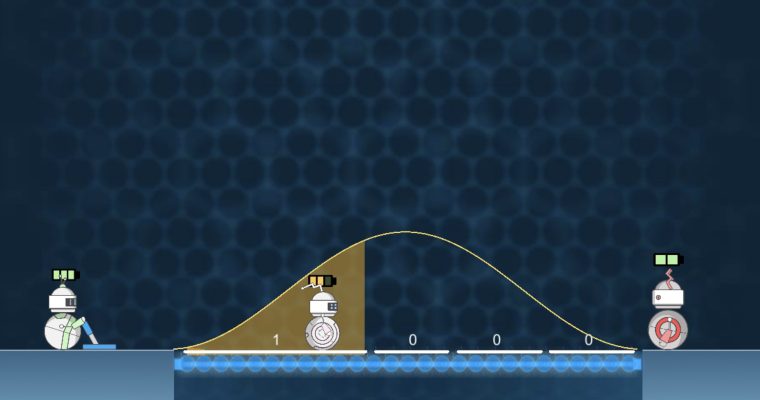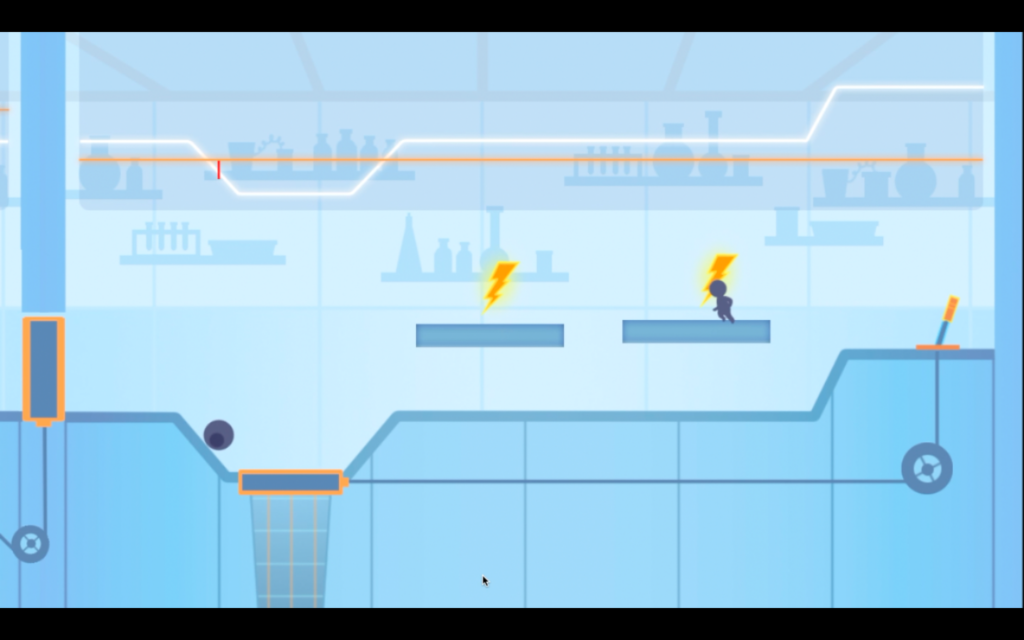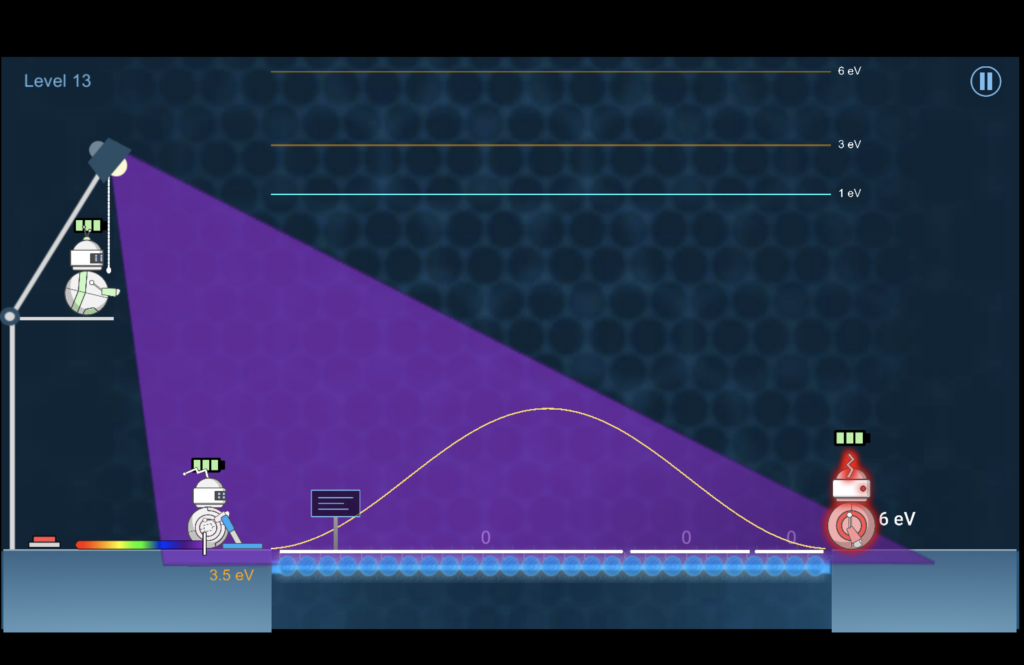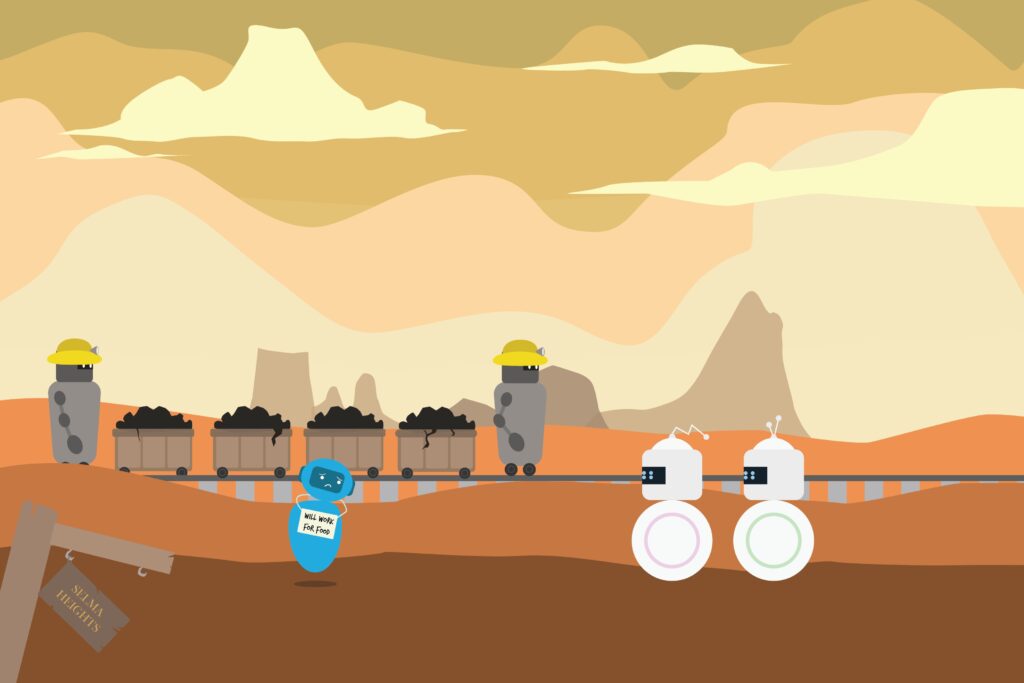with Aditya Anupam and Azad Naeemi

Digital games have the ability to engage students not only with technoscientific concepts, but also technoscientific practices and contexts. We explore how educational games can foster such engagements in electrical engineering. Specifically, we have created/are creating three games that help students explore the concepts, practices, and contexts of quantum physics and microelectronics. Check out our games at learnqm.gatech.edu!
Particle in a Box

Particle in a Box is a 2-D single-player platformer game built in Unity in which the player plays the game through a virtual avatar who travels through a 2-D rendition of the classical and quan- tum worlds. The classical world, set in a lab-like environment, involves challenges based on Newtonian physics such as jumping over a ball and increasing its total energy. After playing the classical world, players shrink down to the quantum world which is based on the infinite square well problem. It involves an electron that is trapped in a 1-D quantum wire and exhibits quantum behavior such as superposition and energy quantization. The challenges here are based on understanding introductory quantum physics. Experiencing both worlds affords students the opportunity to compare their similarities and differences—an approach that has shown to be effective in learning quantum physics.
Psi and Delta

Psi and Delta builds on our findings of Particle in a Box by students adopting the role of two robots, with the aim of defeating opposing robots in a world governed by the laws of quantum mechanics. Students accomplish this task using concepts of quantum mechanics to lure and “shock” the opposing bot. If a student’s bot touches the opposing bot or gets “shocked,” it loses part of its health. If any player’s bot loses all of their health, the level restarts. The game is divided into two parts. In part 1, students develop models of the concepts of superposition and probability. In part 2, students develop models of energy levels. The game encourages students to learn both sets of concepts through collaborative inquiry. Success in Psi and Delta requires students to strategize and coordinate their actions to defeat the opposing bot.
Solaria (theoretical)

Building on research in games for teaching inquiry and concepts of quantum and semiconductor physics, the educational goal of this platformer-style multiplayer game was to engage students in open-ended inquiry into the life-cycle of semiconductor devices, particularly solar cells. Each student would play as an electrical engineer from a different settlement in a large and variegated region and aim to study, develop, and distribute electronic devices. Students roles as citizens of different settlements would impact their relationship with others since some settlements would have more power over others. The game was designed not to explicitly have a goal or problem that needed to be solved. Instead, our design goal was to have it function more as an open environment that students would need to problematize or create doubts about thereby facilitating the learning of inquiry and how it is value-laden, situated, and open-ended.
Related publications and presentations:
- Anupam, Aditya. 2022. “Teaching Scientific Inquiry as a Situated Practice: A Framework for Analyzing and Designing Science Games.” Learning, Media and Technology 47 (1): 125–42. doi:10.1080/17439884.2021.2020285.
- Anupam, Aditya. 2021. “Can Digital Games Teach Scientific Inquiry?: A Case of How Affordances Can Become Constraints.” Proceedings of the ACM on Human-Computer Interaction 5 (CHI PLAY): 1–21. doi:10.1145/34747
- Anupam, A., Gupta, S., Naeemi, A., & Parvin, N. (2019, October). Beyond Motivation and Memorization: Fostering Scientific Inquiry with Games. In Extended Abstracts of the Annual Symposium on Computer-Human Interaction in Play Companion Extended Abstracts (pp. 323-331). https://dl.acm.org/doi/abs/10.1145/3341215.3356309
- Anupam, Aditya, Ridhima Gupta, Shubhangi Gupta, Zhendong Li, Nora Hong, Azad Naeemi, and Nassim Parvin. 2020. “Design Challenges for Science Games: The Case of a Quantum Mechanics Game.” International Journal of Designs for Learning 11 (1): 1-20.
- Aditya Anupam, Ridhima Gupta, Azad Naeemi, Nassim JafariNaimi, “Particle in a Box: An Experiential Environment for Learning Introductory Quantum Mechanics.” IEEE Transactions of Education. 61: 1 (February 2018): 29-37. https://ieeexplore.ieee.org/abstract/document/7999225/
- Rose Peng, Bill Dorn, Azad Naeemi, and Nassim JafariNaimi “Interactive Visualizations for Teaching Quantum Mechanics and Semiconductor Physics,” in the 2014 Frontiers in Education (FIE), (Madrid, Spain: IEEE 2014).
- Rose Peng, Mithila Tople, Bill Dorn, Azad Naeemi, Nassim JafariNaimi, “A Novel Interactive Paradigm for Teaching Quantum Mechanics,” in 11th annual Games+Learning+Society Conference (GLS11), (Wisconsin-Madison, USA).
